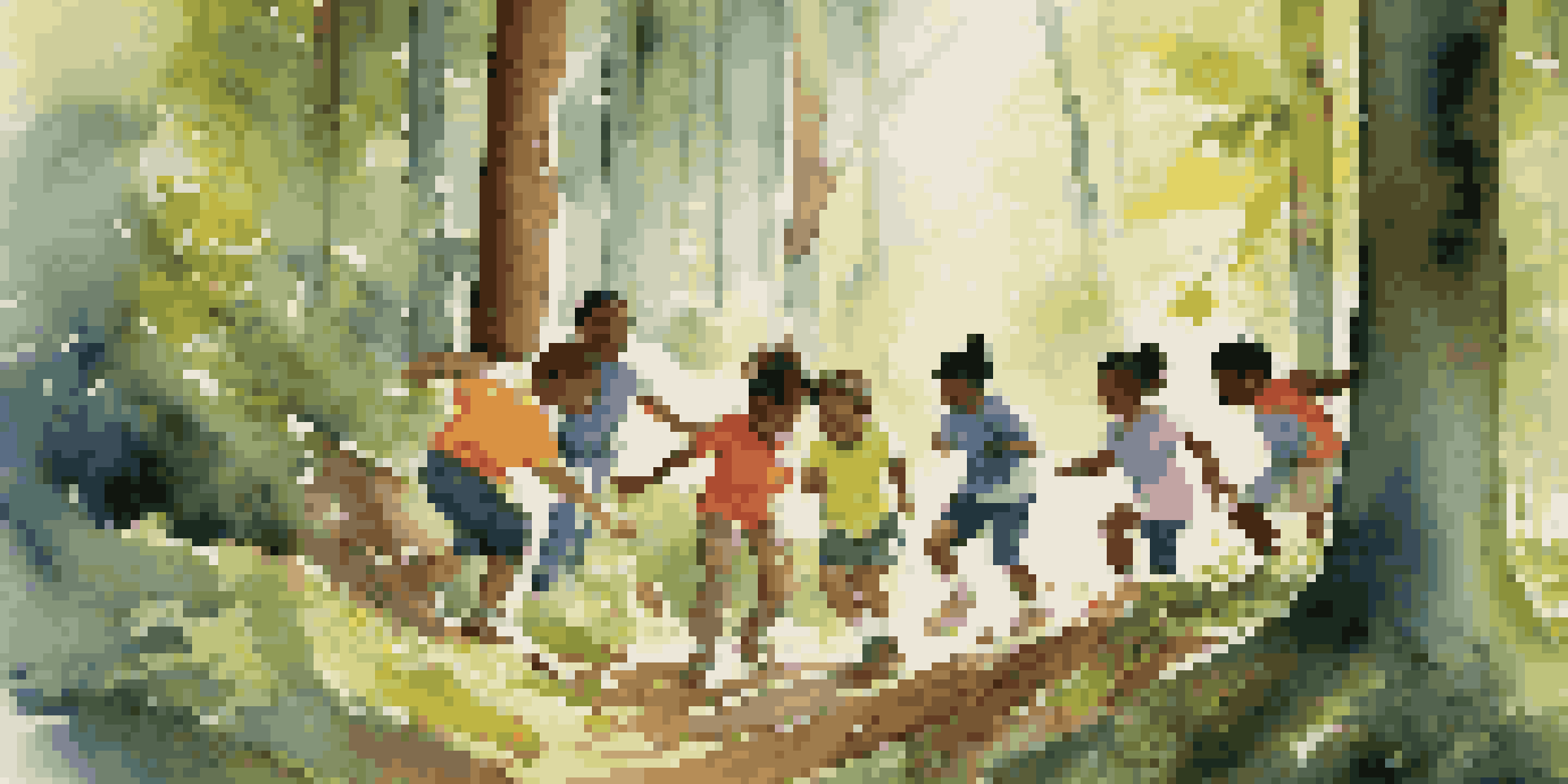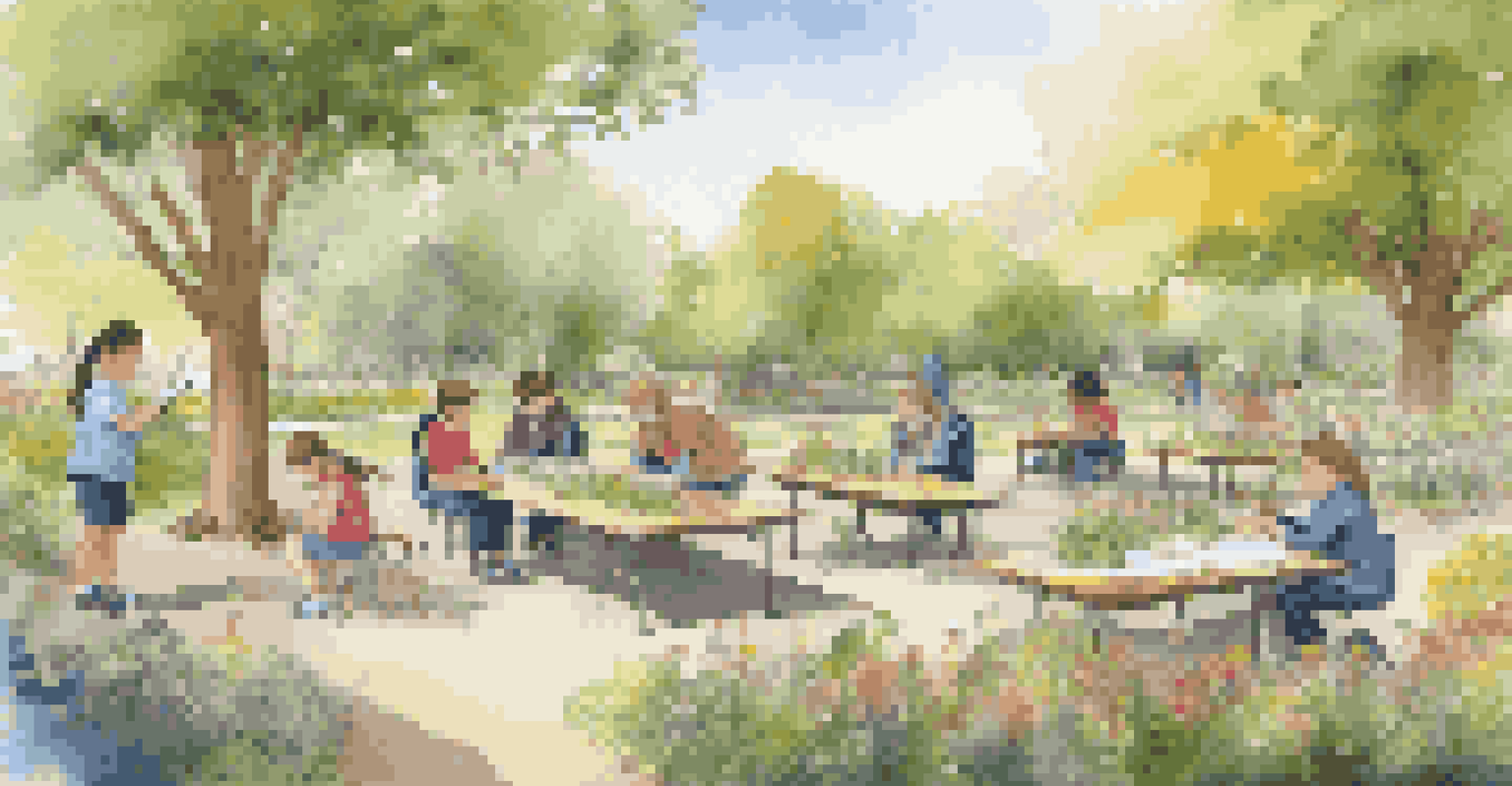Creating Community Connections Through Outdoor Education

Understanding Outdoor Education and Its Importance
Outdoor education is a hands-on learning experience that takes place outside the traditional classroom. It emphasizes experiential learning, allowing participants to engage directly with nature and their surroundings. This approach not only enhances knowledge but also fosters a sense of community among participants.
In every walk with nature one receives far more than he seeks.
By immersing learners in outdoor settings, they can explore concepts like teamwork, resilience, and environmental stewardship. These experiences promote personal growth and help individuals to form lasting connections with their peers. The shared challenges and discoveries in nature create a unique bond that can't be replicated indoors.
Moreover, outdoor education can serve as a bridge between diverse communities, uniting people from different backgrounds through common experiences. When individuals come together to learn in nature, they often find common ground, leading to stronger community ties and mutual respect.
The Role of Nature in Building Connections
Nature has a unique way of bringing people together. When individuals step outside of their daily routines and into the natural world, they often feel a sense of freedom and openness that encourages connection. This shared experience in a beautiful environment can lead to meaningful conversations and friendships.

Moreover, outdoor activities often require collaboration, whether it's hiking, canoeing, or camping. These shared adventures create memories and foster teamwork, helping participants to support one another. As they navigate challenges together, they build trust and camaraderie, which are essential components of any community.
Benefits of Outdoor Education
Outdoor education enhances personal growth, teamwork, and environmental awareness through hands-on experiences.
Additionally, being in nature can reduce stress and enhance well-being, making people more receptive to forming connections. When individuals feel relaxed and at ease, they are more likely to engage with others, creating an environment ripe for building relationships.
Creating Inclusive Outdoor Education Opportunities
Inclusivity is crucial in outdoor education. Programs should be designed to welcome individuals of all backgrounds, abilities, and ages. This inclusivity not only enriches the experience for all participants but also reflects the diverse nature of the communities they are a part of.
The best way to predict the future is to create it.
By offering a range of activities that cater to different skill levels and interests, organizations can ensure that everyone feels valued and included. For instance, providing adaptive equipment for individuals with disabilities can open doors for participation in outdoor adventures. This creates a sense of belonging that strengthens community ties.
Moreover, fostering a culture of respect and understanding within these programs helps participants appreciate their differences. When individuals learn together in an inclusive setting, they develop empathy and a deeper understanding of one another, which is essential for building strong community connections.
Developing Leadership Skills Through Outdoor Activities
Outdoor education is not just about learning from nature; it's also about cultivating leadership skills. Participants often find themselves in situations that require decision-making, problem-solving, and collaboration, which are vital leadership qualities. Through these experiences, individuals can discover their strengths and build confidence.
For example, leading a group hike or planning a camping trip encourages participants to take initiative and guide others. These opportunities foster a sense of responsibility and allow individuals to practice their leadership skills in a supportive environment. As they succeed in these roles, they inspire others to step up and lead.
Inclusivity Fosters Community
Creating inclusive outdoor programs strengthens community ties by welcoming diverse participants and promoting empathy.
Ultimately, the leadership skills developed in outdoor education programs can have a lasting impact on communities. As individuals grow into confident leaders, they can take on roles within their communities, promoting positive change and encouraging others to engage in outdoor experiences.
The Impact of Outdoor Education on Youth Development
Outdoor education plays a significant role in the development of youth. Engaging young people in outdoor activities helps them build social skills, resilience, and a sense of responsibility. These experiences are not only enjoyable but also contribute to their overall growth and maturity.
Participating in outdoor education programs allows youth to step outside their comfort zones. Whether it's facing a challenging hike or learning to work as part of a team, these experiences teach valuable life lessons. The confidence gained through overcoming obstacles can translate into other areas of their lives, including academics and personal relationships.
Furthermore, outdoor education fosters a lifelong appreciation for nature and the environment. As young people develop a connection to the outdoors, they are more likely to become advocates for environmental preservation, further strengthening community ties through shared values.
Collaborating with Local Organizations for Greater Impact
Building community connections through outdoor education is often enhanced by collaboration with local organizations. Schools, nonprofits, and community groups can come together to create comprehensive programs that meet the needs of their communities. This collaborative approach amplifies the impact of outdoor education initiatives.
By pooling resources and expertise, organizations can offer a wider variety of programs and activities. For instance, partnerships with local parks or nature reserves can provide access to beautiful outdoor settings for educational experiences. This not only enriches the learning process but also showcases the importance of community resources.
Leadership Skills in Nature
Outdoor activities cultivate vital leadership skills, empowering individuals to take initiative and inspire others.
Moreover, collaboration encourages a sense of ownership among community members. When individuals contribute to the development and execution of outdoor education programs, they feel more connected to the outcomes. This shared responsibility fosters pride and strengthens community bonds.
Measuring the Success of Outdoor Education Initiatives
To ensure that outdoor education programs are effectively building community connections, it's essential to measure their success. This can involve gathering feedback from participants, assessing skill development, and tracking community engagement. Evaluating these outcomes helps organizations understand the impact of their efforts.
Surveys and interviews can provide valuable insights into participants' experiences and the relationships formed during programs. Additionally, observing changes in community involvement and participation in outdoor activities can indicate the success of these initiatives. This data can guide future program development and improvement.

Ultimately, measuring success helps organizations demonstrate the value of outdoor education in fostering community connections. By sharing these results, they can inspire more individuals to engage with both nature and their communities, creating a positive ripple effect.